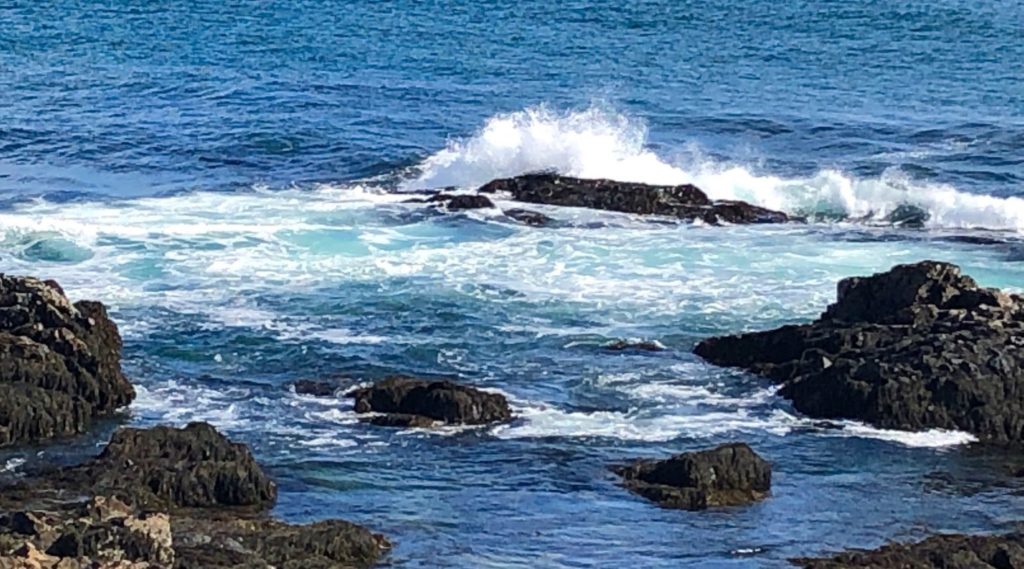Opinion: Love, Justice, And Climate Change. What’s Needed – Changes In Our Economic System

Coast of Maine, near Ogunquit. Photo: Russ Vernon-Jones

Our current economic system in the United States and throughout most of the world is complex, but some of its prominent features are:
- Decisions are made on the basis of what will be most profitable, not on the basis of what will serve the common good or the health of the planet
- Tremendous amounts of wealth continue to be accumulated by a small number of people, while many people have very little. (In the U.S. today the top 10% of the population has 70% of the wealth, while the bottom 50% of the population has 2% of the wealth.)
- The system depends on endless growth–in production, extraction, and consumption.
Such a system has many consequences. Two major consequences are:
- This system has caused and is perpetuating the devastating global climate crisis.
- This system makes it very difficult, and in some cases impossible, to do what needs to be done to solve the climate crisis.
Challenging The Current Economic System
This is not to say that we must create a new economic system before we can do anything about climate change. As we take action on the climate crisis, however, we will need to challenge the current economic system on many fronts. We will need to think and act outside its prevailing paradigms, especially the three identified at the top of this piece:
- We will need to make decisions based on what will serve human needs and protect the environment. Governments at all levels must provide regulations, investments, and incentives that prioritize the common good and address the climate crisis. Businesses must be required to be socially responsible and not simply maximize shareholder return. We will need more cooperatives, worker-owned businesses, and public ownership of key sectors such as the energy sector.
- We will need to distribute the wealth of the society much more equally. The wealthy elite has been wielding disproportionally great political and economic power to further enrich themselves and block climate action and social justice. We need to reclaim sufficient money from the wealthy to fund climate action, good schools and health care; eliminate poverty; fund our global climate responsibilities; and build a society that works for everyone. As Bernie Sanders has said, “There should be no billionaires.” We will need wealth taxes to bring about the needed changes. (Historical note: Under President Eisenhower, the marginal income tax rate on the wealthy was 91%, and the economy thrived.)
- We will need to reduce consumption (which we can do while providing an adequate standard of living for all) and live more lightly on the earth. We will need to eliminate the extraction of coal, oil, and gas, and the exploitative taking of resources from poorer nations. We must provide a just transition for workers and provide guaranteed employment and income for all.
Common Sense? … Radical? … What’s Needed
To some of you, the above may sound like simple, good common sense. To others of you, it may sound radical. Either way, I’m not alone in thinking that this is what will be required to solve the climate crisis. We don’t need all of this immediately, but if we are to stop global greenhouse gas emissions and prevent total climate catastrophe, we need to be moving in these directions on all fronts. The climate crisis is not caused just by bad actors, although there are plenty of those; it is the inevitable result of an economic system based on heedless pursuit of profit, gross inequality, and endless growth.
Elements we might use and/or learn from
I am not suggesting that we adopt any other economic system that already exists or has existed in the past. As we move forward we will need to create something new–designed to fit our present circumstances, including the climate crisis. Fortunately, new systems begin to grow within the old, and seeds of the changes listed above have already been planted and are sprouting. We can incorporate more climate-friendly and just features that humans have figured out in the past and/or are practicing on a smaller scale now. Some possibilities include:
- viewing nature as a relative rather than as a commodity, characteristic of many Indigenous societies around the world;
- the all-out, shared commitment and sacrifice of the World War II domestic mobilization in the U.S.;
- the sense of belonging, caring for each other, and social responsibility that characterize relationships in many Global Majority and Indigenous cultures;
- the many successful electric and water utilities across the U.S. that are democratically owned by their consumers, not by corporations or their investors;
- the works councils in Germany and other European countries;
- the farming and grazing practices of regenerative agriculture (some traditional, some new) as currently practiced in many so-called “less developed” areas from Mexico to Kenya;
- and the resilience, creativity, and love that characterize all of us humans at our best.
What would you add to this list as examples or elements that we might emulate as we seek to build a society that works for everyone?
In a future post I’ll offer some more thoughts about the key role that racism plays in keeping our grossly unequal, climate destroying, economic system in place. I’ll also share thoughts about other features and ideas that prop up our current system and might offer leverage points as we seek to make needed changes.
I am deeply sad about the war in Europe. I admire and appreciate each of the Ukrainians who is courageously standing up to the invaders, and each of the thousands of Russians who have had the courage to protest –calling for “No War!” In the face of this war, let’s reaffirm that every human life matters; that the divisions among us are less important than our common humanity; and that war is not an effective way to deal with conflicts. In addition to the horrible death, destruction, and suffering of war, it is also terrible for the fragile climate that we are trying to preserve. Let us grieve for the suffering and the losses of all those who are caught up in war, and join hands with people everywhere in a renewed global peace movement.
Russ Vernon-Jones was principal of Fort River School 1990-2008 and is currently a member of the Amherst Community Safety Working Group and of the Steering Committee of Climate Action Now-Western Massachusetts. He blogs regularly on climate justice at www.russvernonjones.org.
_________________

1 thought on “Opinion: Love, Justice, And Climate Change. What’s Needed – Changes In Our Economic System”